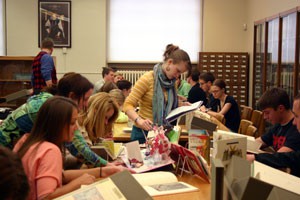Please excuse the NOISE as we add more electrical outlets and data ports to the Veterinary Library. The disruption will be worth it! CVM – IT will soon be adding more computers to the library!
Resources and Services
Check out a laptop at the library!
The library now has four laptops available at the Circulation Desk for two hour checkout. Just bring your valid MU ID. There are both Macs and PCs, loaded with various software such as Microsoft Office, Adobe Creative Suite, ITunes, and much more.
New NAP Book on Food Safety and One Health
Two Mizzou Advantage areas rolled into one! Check out the new National Academies Press book Improving Food Safety through a One Health Approach.
Description:
Globalization of the food supply has created conditions favorable for the emergence, reemergence, and spread of food-borne pathogens-compounding the challenge of anticipating, detecting, and effectively responding to food-borne threats to health. In the United States, food-borne agents affect 1 out of 6 individuals and cause approximately 48 million illnesses, 128,000 hospitalizations, and 3,000 deaths each year. This figure likely represents just the tip of the iceberg, because it fails to account for the broad array of food-borne illnesses or for their wide-ranging repercussions for consumers, government, and the food industry-both domestically and internationally. A One Health approach to food safety may hold the promise of harnessing and integrating the expertise and resources from across the spectrum of multiple health domains including the human and veterinary medical and plant pathology communities with those of the wildlife and aquatic health and ecology communities.
The IOM’s Forum on Microbial Threats hosted a public workshop on December 13 and 14, 2011 that examined issues critical to the protection of the nation’s food supply. The workshop explored existing knowledge and unanswered questions on the nature and extent of food-borne threats to health. Participants discussed the globalization of the U.S. food supply and the burden of illness associated with foodborne threats to health; considered the spectrum of food-borne threats as well as illustrative case studies; reviewed existing research, policies, and practices to prevent and mitigate foodborne threats; and, identified opportunities to reduce future threats to the nation’s food supply through the use of a “One Health” approach to food safety. Improving Food Safety Through a One Health Approach: Workshop Summary covers the events of the workshop and explains the recommendations for future related workshops.
NYT Article on One Health
Vets and Physicians Find Research Parallels
Great New York Times article on One Health!
Dr. Lisa Fortier, our Niemeyer lecturer on September 21st, is featured. As is Dr. Jonathan Levine, who trained with Dr. Coates.
Learn more about One Health
Library construction noise alert
There will be some construction noise in the library starting Tuesday the 11th, as workers on the 2nd and 3rd floor will be using some power tools over the next few days.
West Entrance of Ellis Library Will Be Preferred Entrance This Weekend
ILL@MU upgrade complete
The ILL@MU upgrade was completed at about 3pm, so you should once again be able to request articles. Please contact us if you have any problems.
ILL@MU , the interlibrary loan system for ordering materials not available at MU, will not be available the morning of Thursday, September 6 due to a server upgrade.
Once the server upgrade is complete, the ILLiad server will be available.
If you need any articles immediately, please contact the Interlibrary Loan office at 573-882-0468 or email loanrequest@health.missouri.edu
ILL@MU Will Be Unavailable Thursday Morning
Digital Humanities Colloquia
Calling All Instructors: Bring Your Class to Special Collections!
 As part of a class session in Special Collections, your students will have hands-on access to the most inspiring and intriguing materials the Libraries have to offer. They will learn research skills that go beyond databases – the ability to track down sources, make connections among documents, and read the content of the page alongside physical evidence. Most importantly, they will discover an enthusiasm and engagement with their subject that will take their studies far beyond their textbooks.
As part of a class session in Special Collections, your students will have hands-on access to the most inspiring and intriguing materials the Libraries have to offer. They will learn research skills that go beyond databases – the ability to track down sources, make connections among documents, and read the content of the page alongside physical evidence. Most importantly, they will discover an enthusiasm and engagement with their subject that will take their studies far beyond their textbooks.
What can we do for you?
- Orientations to books, microforms, etc.
- Course-specific presentations (your classroom or our reading room)
- Individual research consultations (for you and your students!)
- Help with assignment development
The collections are diverse, and we can accommodate a wide variety of disciplines. In 2011-2012, class visits included groups ranging from Engineering to English. Browse our spotlight to see the innovative ways your colleagues are taking advantage of our collections and services!
We’re here to help. Email SpecialCollections@missouri.edu or call (573) 882-0076 to schedule a session for your class.